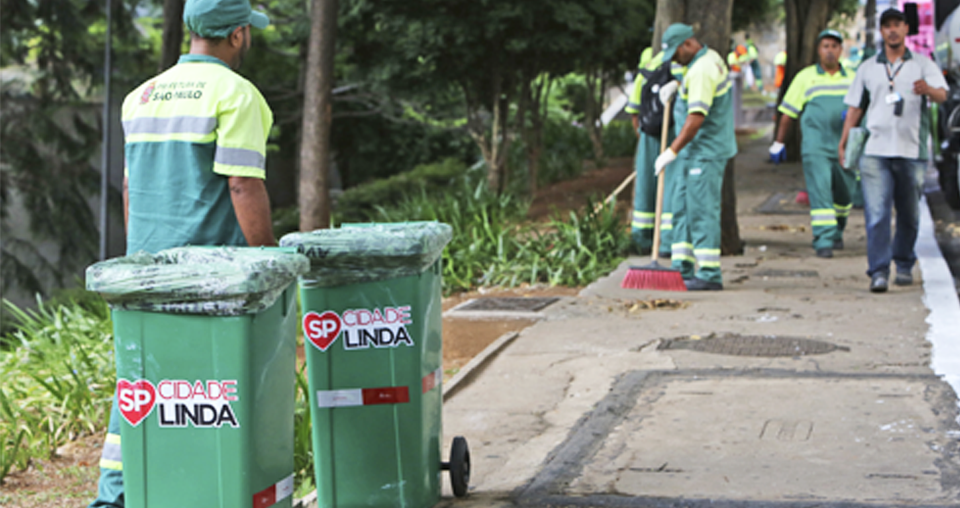The use of technology as a tool to enable sustainable development is a trend seen in cities around the world. Understand the case of CTR-E, the software that brought more control and traceability in waste management in the City of São Paulo.

In the largest city in Brazil, São Paulo, more than 12 million inhabitants produce about 20 thousand tons of garbage every day. This represents about 8% of all waste generated in the country.
In view of these great numbers, some doubts must arise: how is waste management done in the city of São Paulo? And in other municipalities? Are technologies available to assist with this issue? How can we reduce the problem of waste?
In this article on the Green Gear blog you’ll understand better about the problems and difficulties of waste management in cities, how technology can be a great ally to this and the system that uses software, applications and QR Codes to track waste in the city of São Paulo, the CTR-E.
- The problems and difficulties of waste management;
- Technology is the greatest ally;
- How does PlataformaVerde contribute to waste management in the city of São Paulo?
The problems and difficulties of waste management in cities
Managing solid waste in big cities isn’t an easy task!
A major problem found in all Brazilian cities when it comes to waste management, is the difficulty of public authorities in tracking the generation and disposal of urban waste. This happens because, in addition to inappropriate behavior on the part of the population, there is an inefficiency of policies in this area. And whoever ends up suffering from environmental and social problems is unfortunately all of us.
Day after day, irregular disposal contaminates water resources, the natural environment and the soil, causes flooding and poses an enormous risk to the urban population. This impacts not only the environment, but also public health.
For cities to present an efficient administration and reduce the degradation that the disposal of solid waste brings to nature and public health, there are some obstacles. Complying with the guidelines of the National Solid Waste Policy (PNRS) is the first of them; adjust the final disposal of each waste according to its components and materials, without using dumps and/or other environmentally inappropriate places; adopting measures and best practices for waste, such as reuse, recycling and selective collection, also pose challenges.
In addition, the government must invest in environmental awareness and education to minimize the impacts caused by the behavior of the population and to inspect large companies that generate waste to contain the negative impact on the cities and the environment in which they operate. Having tools that concentrate the data of these companies and bring transparency to the urban waste path also helps in the process and enables the public authorities to inspect and punish those who violate the environmental law.
Technology as an ally in waste management
Currently, with the advance of the 4th Industrial Revolution, the tools that help promote sustainability, reduce the consumption of environmental resources and improve waste management in cities are in the technological sector.
This sector has played a major role in pointing out new paths for industries and companies in all segments of the economy, becoming an important ally in areas such as productivity, quality, automation, mechanization and efficiency. Innovation and technology make it possible to work on a fundamental aspect for organizations: the sustainability of the environment.
Therefore, in this context, public-private partnerships (PPPs) appear as a solution. They can help Brazilian cities to overcome obstacles to efficient management in different ways. Making processes more efficient, reducing costs and contributing to the reuse and adequate reverse logistics of waste.
How PlataformaVerde contributes to waste management of the city of São Paulo?
Thinking about the whole problem of waste management, GreenPlat developed in 2017 the CTR-E, a blockchain software for traceability and waste control. All private entities in the city are registered in the software and insert data on what they generate and where they dispose of their waste.
Through this software, we were able to register 16,800 waste generators – before that, only a thousand companies declared themselves large waste generators and help the municipality create policies that oblige all companies listed in São Paulo to register in the CTR-E system.
This positively affects the urban population, as we reduce incorrect disposal, inhibiting the contamination of water resources, the natural environment, the soil and floods. In addition to helping companies and waste management workers in the public and private sectors, offering traceability, transparency and agility to their process.
Get in touch with our sales team by email: comercial@plataformverde.com.br and get to know our public and private solutions.

Estudante de Publicidade e Propaganda com ênfase em Criação. Apaixonada pela comunicação e pela natureza. Cinéfila nas horas vagas e aventureira de meia tigela.